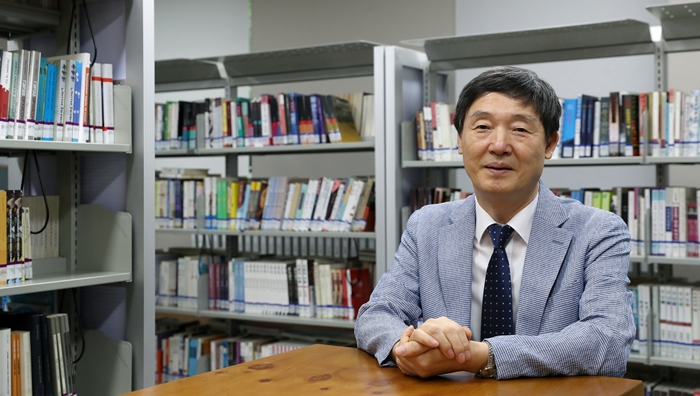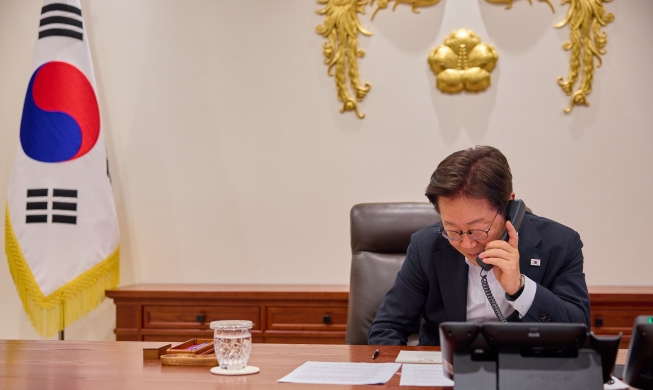By Min Yea-Ji and Kim Young Shin
Photos = Jeon Han
Video = Kim Sunjoo and Choi Tae-soon
Seoul | Aug. 9, 2018
“The 'Korean Wave' of literature has just begun.”
So said President Kim Sa-in of the Literature Translation Institute of Korea (LTI) as he talked about the growing number of Korean literary works that are winning international awards, during an interview on Aug. 9 at the LTI library in Seoul.
Han Kang’s “The Vegetarian” (채식주의자), the 2016 winner of the Man Booker International Prize, and Hwang Sok-yong’s “At Dusk” (해질 무렵), the 2018 winner of the Emile Guimet Prize for Asian Literature, are just beginning to show the popularity of Korean literature outside of Korea.
Jeong Yoo-jeong’s “The Good Son” (종의 기원) was introduced in the U.S. on NBC's Tonight Show by the host, Jimmy Fallon, as a must-read of the summer, on June 5. Kim Un-su signed a six-figure contract with U.S. publisher Doubleday for his thriller “The Plotters” (설계자들). Germany’s weekly magazine Der Spiegel compared Han Kang’s “The Vegetarian” with works by Franz Kafka.
Korea.net sat down with President Kim, the “top literary diplomat” of the country, to hear more about this new boom in Korean literature.
The passion and effort of the institute was visible in the LTI library, where the interview was held, as the bookshelves were filled with 20,000 translated Korean literary works in 47 languages.

President Kim Sa-in of the Literature Translation Institute of Korea (LTI) explains that the vivid depiction of contemporary history, significant levels of aesthetic expression, and the profoundness of its philosophical themes, are the three main charms of Korean literature that appeal to non-Korean readers, during an interview on Aug. 9.
- More readers are attracted to Korean literature these days. Why is that?
The literary and historical potential of Korea has finally been proven. The hidden efforts of the many quality translators should also be noted, too.
- What are the charms of Korean literature that have captured the eyes of global readers?
In the eyes of the Western world, the past century in Korea has been simply amazing because of our social changes and economic achievements.
There is this dynamic in almost every Korean work that has come out of the war, the division of the Korean Peninsula, political turbulence, economic prosperity and all the damage and conflict created in the process. This kind of vitality is uncommon in the works created in Western countries.
At the same time, Korean literary works are no longer unusual or unfamiliar. They are recognized for their aesthetic and philosophical profoundness.
- Do you actually feel that more people around the world are reading Korean literature?
Sure. From 2015 to 2017, the number of overseas publishers contacting us for contracts jumped more than three times. In 2015, there were requests for 20 different books and in 2017, it jumped to 70. This shows that renown international publishers have started to introduce translated Korean novels and poems to their readers on their own.
It's not yet a satisfying number. However, compared to the past, when we had to ask and persuade non-Korean publishers to print Korean works, it's a significant change.
- What does the LTI do to promote Korean literature worldwide?
We plan to strengthen our efforts to highlight the beauty and charms of Korean literature to regions in Southeast Asia, Africa, the Middle East and Central Asia, regions that all use less-widely spoken languages.
At the same time, we will also strive to share traditional Korean literature with the world.
- Is there any Korean novel that you want to recommend to Korea.net readers?
First, I would like to recommend Kim Un-su and Jeong You Jeong’s novels. Many non-Korean readers found their works interesting because of the mystery, suspense and thriller elements, which is a current trend in Korean literature.
“Kazanto” (Volcanic Island), a fictional series written in Japanese by Kim Sok-pom, a Korean-Japanese writer, and Korean-Chinese Kim Hakchul’s novels, are also good.
The LTI will make it easier for non-Korean readers to discover the hidden treasures of Korea and its traditional literature.
jesimin@korea.kr
Most popular
- Council sets minimum hourly wage in 2026 at KRW 10,320
- Songs from 'KPop Demon Hunters' dominate global Billboard charts
- Songs from animated K-pop film rule Spotify daily chart in US
- 28th annual Boryeong Mud Festival to offer more night events
- Exhibition 'K-Comics World' hawks webtoons in 5 countries
